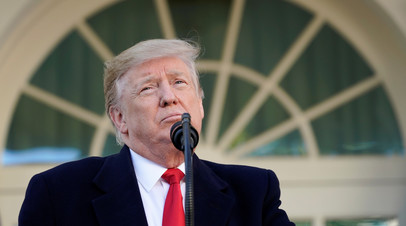- Joined
- Apr 18, 2013
- Messages
- 94,109
- Reaction score
- 82,393
- Location
- Barsoom
- Gender
- Male
- Political Leaning
- Independent
Trump Is Destroying His Own Case for a National Emergency

There you have it. Trump cannot bypass Congress by bastardizing the National Emergencies Act simply because he can't force Congress to fund his pet wall project.
Virtually any Federal Circuit and Appellate Court will easily be able to distinguish between a bona-fide national emergency (i.e. 9/11) and Donald Trumps fundamental intent here to circumvent the US Congress.

Here’s how the legal process for emergency powers works: Under the National Emergencies Act, passed by Congress in 1976, the president has broad discretion to declare a national emergency. Upon issuing the declaration, he gains access to special authorities provided in 123 provisions of law that have been enacted over many decades. These laws authorize presidential action across all areas of government, from military deployment to agricultural exports to energy production. Like an advance medical directive, in which a patient specifies actions a doctor may take in a range of extreme situations when the patient cannot make her wishes known, they represent Congress’s best guess as to what powers a president might need in a crisis that is unfolding too quickly for Congress to respond. As this legal framework makes clear, emergency powers are not a license for the president to sidestep Congress. To the contrary: The only powers the president can access during a national emergency are those Congress has granted. However potent some of these powers might be, the source of the president’s authority in all cases remains a legislative delegation—one that is granted in advance because true emergencies require immediate action. A president using emergency powers to thwart Congress’s will, in a situation where Congress has had ample time to express it, is like a doctor relying on an advance directive to deny life-saving treatment to a patient who is conscious and clearly asking to be saved.
Of course, Trump’s hesitation also belies his claim that there is an emergency at the border. Presidents don’t dawdle in the face of real emergencies. President George W. Bush did not spend weeks scratching his head about whether to issue an emergency declaration after the terrorist attacks of 9/11. But even if a real crisis existed, emergency powers are designed for situations in which Congress has no time to act. If Congress does have time, then there is no justification for bypassing the ordinary legislative process. Indeed, the more time Congress has to act—and the more times it votes against providing the funding the president has asked for—the clearer it becomes that an emergency declaration in this case would be designed as an end run around the Constitution. Article I provides that “no Money shall be drawn from the Treasury, but in Consequence of Appropriations made by Law.” This provision is one of the Constitution’s most important checks against executive-branch overreach. Congress has now consistently declined to appropriate funding for the border wall. Whatever deference judges might owe to the president’s assessment of what constitutes an emergency, an interpretation of the National Emergencies Act that would allow the president to engage in an expenditure of funds for which Congress has expressly withheld consent cannot be squared with the Constitution. Trump is right about one thing: He should give Congress time to debate, deliberate, and vote. But if Congress continues to vote against providing funding, that is a decision the Constitution commands the president to respect. The National Emergencies Act is not—and was never intended to be—a constitutional workaround for a president who cannot bend Congress to his will.
There you have it. Trump cannot bypass Congress by bastardizing the National Emergencies Act simply because he can't force Congress to fund his pet wall project.
Virtually any Federal Circuit and Appellate Court will easily be able to distinguish between a bona-fide national emergency (i.e. 9/11) and Donald Trumps fundamental intent here to circumvent the US Congress.
